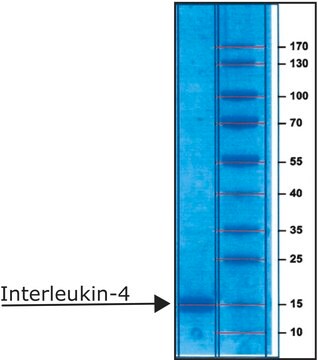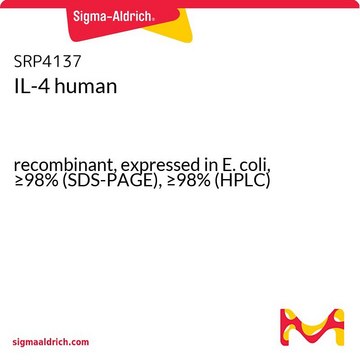I3650
Interleukin-4 from rat
recombinant, expressed in E. coli, lyophilized powder, suitable for cell culture, ≥97% (SDS-PAGE)
Sinónimos:
rIL-4, IL-4
About This Item
Productos recomendados
biological source
rat
Quality Level
recombinant
expressed in E. coli
assay
≥97% (SDS-PAGE)
form
lyophilized powder
mol wt
predicted mol wt 13.5 kDa
packaging
pkg of 5 μg
technique(s)
cell culture | mammalian: suitable
impurities
endotoxin, tested
UniProt accession no.
storage temp.
−20°C
Gene Information
rat ... Il4(287287)
Biochem/physiol Actions
Physical form
Analysis Note
Storage Class
11 - Combustible Solids
wgk_germany
WGK 3
flash_point_f
Not applicable
flash_point_c
Not applicable
ppe
Eyeshields, Gloves, type N95 (US)
Certificados de análisis (COA)
Busque Certificados de análisis (COA) introduciendo el número de lote del producto. Los números de lote se encuentran en la etiqueta del producto después de las palabras «Lot» o «Batch»
¿Ya tiene este producto?
Encuentre la documentación para los productos que ha comprado recientemente en la Biblioteca de documentos.
Los clientes también vieron
Nuestro equipo de científicos tiene experiencia en todas las áreas de investigación: Ciencias de la vida, Ciencia de los materiales, Síntesis química, Cromatografía, Analítica y muchas otras.
Póngase en contacto con el Servicio técnico







